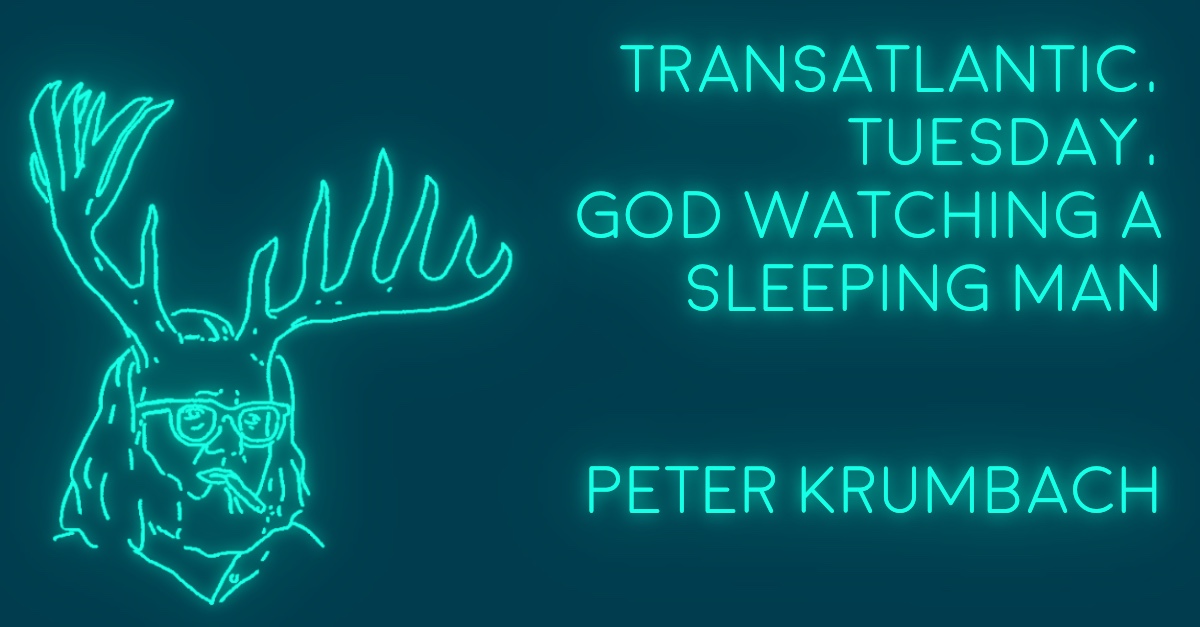Transatlantic
This alone. The man on the TSA line right in front of you, carrying caribou antlers. Yes, you drank. Yet no doubt. There he stands with the horns. And guess what. He looks like Ted Berrigan. He may be Ted Berrigan. What do you tell Ted Berrigan hauling a set of antlers? Hello Ted? No. You begin to talk about the eleven-foot narwhal tusk the lady ahead of him wheels atop her suitcase. Narwhal, says Ted. Basically a beluga whale. The tusk one of its two teeth. The TSA folks snap their blue rubber gloves against their wrists. The one who reminds you of Anne Waldman, ca 1966, walks over to Ted and asks for his belt. Then your boots. The woman with the tusk is petitioned by three agents to hold her arms out like a pelican. You expect to be quizzed. About bear spray and bicycle chains. Whether you saw anyone pack cymbals, darts, or fertilizer into your luggage. Do you journey with fire extinguishers, throwing stars, snow globes, or sand? But no one wants to know. Even the president on the overhead TV is indifferent, the other screen stressing the shortage of corn, the wisdom of gold. And Ted is being patted, the antlers a Joshua tree high above his hair. You calculate the distance to the gate where the burnished dildo of the plane rests on its gear. And what does Anne do? She waves you through, putting makeup on empty space, painting the phenomenal world. Her palms cup your heart. A tiny joy, then another. You will be late.
Tuesday
I eat pudding. The fighter jet, thousands of feet above me, barrel rolls, the pilot’s horizon spinning like a Dutch mill. I hear the distant roar, scrape the plastic cup with a spoon. It’s Tuesday. I like to drive slow, past the parking lot’s dying hedges, the fat blue mailbox bolted to the sidewalk. It pleases me. Day, after day, after day, it is there. Today, beside that box, orange-robed and sandaled, stands a Buddhist monk. He is still, shaved skull bent down, looking at his phone. I head to the library. A monthly meeting of poets and anti-poets in a cell-sized room. When I arrive, they already speak of burials. By now the jet pilot might have slipped out of her mirror-vizored helmet and walked toward a canteen where someone waits. The 84-year-old woman across the table from me describes a couple who has chosen to be buried in coffins stacked on top of each other in one grave. All of us nod and reach for grapes laid out in a small wire basket shaped like a pig. The library walls are thin. I can hear the group in the next room. They discuss 3D-printed guns. Someone laughs so hard he begins to cough, then gag. I remind myself it is still Tuesday. What’s the pilot up to now? Having sex with her wife, or husband? Or her weapon’s officer, whose ex-fiancé’s at the funeral of an aunt who happened to be a co-worker of the man whom I’m watching through the window cross Draper Street, almost being hit by a silver Lexus? We read poems, and the pale-green grapes are seedy and warm. Thank you, I say to Estelle, who brought them and sits to my right. What? she says. The people behind the wall have now switched to prostates or preserves, it’s not very clear, since they’ve lowered their voices. Laura is reading her poem about a family violin, a lovely piece that ends with the word, “Jakarta.” I’m giving her my compliments and as I pause to search for the correct praise, the two wings of the swing door open. A frail, elderly woman in a motorized wheelchair backs into the room. A young caretaker runs after her from the hall, stops the chair, and apologizes. Two poets rise to hold the wings open and the caretaker wheels the woman back out into the hall. Now I don’t remember the gist of my compliment. On the way home, stuck in traffic, I have almost completely forgotten the jet pilot and her lover, and think of the wheelchair lady, the way she turned her head and seemed to have peeked at me before they took her away. And I think of Sharon, telling us that in New Orleans cemeteries, when you stop paying rent, they evict the bodies.
God Watching a Sleeping Man
He breathes through his nose, his mouth, then the entire twenty-two square feet of his skin. I let his eyes roll, dream of the underground. I show him worms and quartz, turn him into a big-headed mole rat, make him see with his snout. His body-smell, caught in a draft, slips out the open window, into oak leaves. I can end his life, let his tongue drop into his throat, have him see white. White so white it turns black and tight, like patience trapped in rocks. But I let him live, let him snore, wake with dry mouth, paw the dark. Watching him, I ponder the degree to which he’s me. After raving on Fridays, when he collapses into linen, I have him walk in his sleep. Yes, it is cruel. I am cruel. And kind. But mostly cruel. I let him trip, stray naked into the neighbors’ yard, ram their grill with his erection, cannonball into their spa. I tug on strings to pull him out, to sway his arms, curl his lip. He may be rich, with jelly-slicked hair, but when he sleeps, he’s like everyone else. Why kill him when I can sow doubt, hide his rings, roll a grape to the toe of his shoe?

